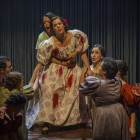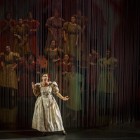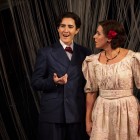Ainadamar 2022Scottish Opera
Read more about the opera Ainadamar
In his critically acclaimed opera, Argentinian composer Osvaldo Golijov creates a vibrant, poetic sound world, combining opera with flamenco dance and song.
Ainadamar is the Spanish pronunciation of the Arabic 'Ayn-al-Dam', meaning 'The Fountain of Tears'.
The opera reimagines and explores the life and work of Federico Garcia Lorca - playwright and poet - whose anti-fascist stance and open homosexuality led to his death in 1936 at the hands of Franco's Nationalist Falange during the Spanish Civil War.
This production, the first staging in Britain, was an exciting event, greeted with huge enthusiasm by the crowded audience. At the second Edinburgh performance it was good to see such a high proportion of young audience members.
The concept of the staging was apparently simple - muted colours, cleverly conceived projections, with draperies and screens, with a small platform to help the singers project. The troupe of dancers provided movement that was essentially Hispanic in style, and the presence of a flamenco vocalist, Alfredo Tejada.
This was a superb company effort, perhaps dominated by Stuart Stratford's wonderful orchestra. This was playing of real fire and commitment.
The principal singers all seemed to have a thoroughly idiomatic command of a work which is unusual in style by comparison with the usual operatic repertory. The three most prominent roles, Margarita, her student Nuria, and Lorca himself, were brilliantly taken by Lauren Fagan, Julieth Lozano, and Samantha Hankey.
This was a thoroghly rewarding event, the first performance by Scottish Opera from the huge, but little regarded, repertoire of Hispanic opera.
The Edinburgh Festival has toyed with it occasionally. Falla's La vida breve was staged in 1958 (with the wonderful Victoria de los Angeles) and given in concert in 1989. Two zarzuelas were given during Brian McMaster's directorship - La Chulapona (Moreno Torroba) in 1989 and La Verbena de la Paloma (Bretón) in 1997.
Performance Cast
- Margarita Xirgu an actress and friend of Lorca
- Nuria a student of Margarita Xirgu's
- Federico García Lorca a poet and dramatist
- Ruiz Alonso a Falangist officer
- José Tripaldi a Falangist guard
- Torero a bullfighter
- Maestro a teacher
- Solo Niña 1
- Solo Niña 2




